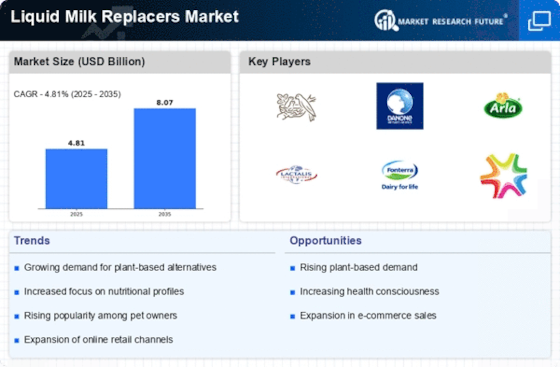Top Industry Leaders in the Liquid Milk Replacers Market

Strategies Adopted by Liquid Milk Replacers Key Players:
The Competitive Landscape of the Liquid Milk Replacers Market is a dynamic and evolving arena, shaped by the increasing demand for high-quality nutrition for young animals, particularly in the dairy and livestock industries. Key players in this market have strategically positioned themselves to address the growing need for effective milk replacers. Prominent industry participants include Cargill, Archer Daniels Midland Company (ADM), CHS Inc., Land O'Lakes Inc., and Glanbia plc. These companies have solidified their positions through a combination of product innovation, strategic collaborations, and a keen focus on meeting the nutritional requirements of young animals.
Key Players:
- CHS Inc. (US)
- Southern Fuel & Farm Supplies Ltd (Ireland)
- Nutreco Holding N.V. (Netherlands)
- PetAg Inc. (US)
- Lactalis American Group, Inc (US)
- Archer Daniels Midland Company (US)
- Calva Products, LLC (US)
- LAND O'LAKES, INC. (US)
- Cargill, Incorporated (US)
- Hi-Pro Feeds LP (US)
Factors Shaping Market Share:
Unraveling the market share story entails a closer look at several key factors. The type of milk replacer (medicated or non-medicated) plays a significant role, with non-medicated options currently dominating due to their cost-effectiveness. The target animal species also matters, with calf milk replacers holding the largest share due to the intensive rearing practices in the dairy industry. Furthermore, regional variations in livestock populations and farming practices influence market dynamics. For instance, the Asia-Pacific region is expected to witness the fastest growth, driven by the rapidly expanding livestock sector in countries like China and India.
New Blood Enters the Fray:
The liquid milk replacers market is constantly evolving, attracting new entrants with innovative offerings. One such trend is the growing focus on organic and natural milk replacers, catering to the increasing consumer demand for ethically sourced, sustainable products. Companies like Milk Specialties Global are capitalizing on this trend, offering organic milk replacers for calves and piglets. Another area of innovation is the integration of smart technologies into milk replacers. For instance, some companies are developing sensors that monitor the intake and digestive health of animals fed milk replacers, allowing for data-driven adjustments and improved animal welfare.
News Nuggets and Investment Trends:
Keeping tabs on industry news reveals the shifting sands of the market. Recent acquisitions, like Cargill's purchase of Provimi in 2021, highlight the consolidation trend among larger players. Meanwhile, partnerships like the one between Land O'Lakes and Milk Specialties Global signify the value of collaboration in a competitive landscape. Investment trends offer further insights. Increased funding for alternative protein sources like insect meal could potentially disrupt the demand for traditional milk replacers in the long run. However, ongoing research into improving the nutritional profile and digestibility of milk replacers is likely to fuel further market growth.
The Competitive Scenario: A Balancing Act
The overall competitive landscape of the liquid milk replacers market is a dynamic interplay of established giants, agile newcomers, and disruptive innovations. Success hinges on a delicate balance between catering to diverse customer needs, embracing R&D for product differentiation, and navigating the evolving regulatory and sustainability landscape. As the market continues to expand, the battle for market share will undoubtedly intensify, promising further dynamism and exciting developments in the years to come.
Recent development :
During the year 2021, Denkavi, a Dutch company, successfully completed the acquisition of FrieslandCampina's animal nutrition division. This strategic move involved taking ownership of well-known milk replacer brands, including Porcolac, Kalvolac, Serolat, among others. The acquired division has a notable production capacity, generating approximately 80,000 metric tons of animal feeds.
In the same year, AB Agri formulated plans to consolidate all its business units under a unified brand called "AB Neo." This restructuring initiative was designed to enhance the company's product range and facilitate the promotion of offerings like Danish Milk Replacers in diverse markets. The rebranding aimed at fostering a cohesive identity for AB Agri's various business units while supporting the expansion of specific products into new and potentially lucrative markets.










